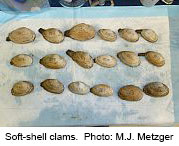- Could Your Grocery Store Meat Be Causing Recurring UTIs?
- Are You Making This Expensive Thermostat Error This Winter?
- Recognizing the Signs of Hypothyroidism
- 10 Strategies to Overcome Insomnia
- Could Artificial Sweeteners Be Aging the Brain Faster?
- Techniques for Soothing Your Nervous System
- Does the Water in Your House Smell Funny? Here’s Why
- Can a Daily Dose of Apple Cider Vinegar Actually Aid Weight Loss?
- 6 Health Beverages That Can Actually Spike Your Blood Sugar
- Treatment Options for Social Anxiety Disorder
Contagious Leukemia Killing East Coast Clams


A lethal marine cancer killing clams along North America’s East Coast is contagious, new research indicates.
Scientists say they’ve traced leukemia outbreaks among soft-shell clams from New York to Canada back to one case of cancer, which was transmitted to other clams.
“The evidence indicates that the tumor cells themselves are contagious — that the cells can spread from one animal to another in the ocean,” said researcher Stephen Goff of the Howard Hughes Medical Institute and Columbia University in New York City.
“We know this must be true because the genotypes of the tumor cells do not match those of the host animals that acquire the disease, but instead all derive from a single lineage of tumor cells,” Goff explained.
The findings, published April 9 in Cell, suggest that cells can survive in seawater long enough to reach and infect a new host. The researchers said it remains unclear if this soft-shell cancer can affect other mollusks, such as snails and mussels.
The leukemia outbreaks have devastated some populations of soft-shell clams for decades, according to background notes with the study.
Previous work by the research team found a specific sequence of DNA, dubbed Steamer, was in much higher levels in the clams with leukemia than in healthy clams. After further examining the genomes of cancer cells collected in New York, Maine and Prince Edward Island, the researchers discovered all of these cancerous cells from different locations were genetically identical clones.
“We were astonished to realize that the tumors did not arise from the cells of their diseased host animals, but rather from a rogue clonal cell line spreading over huge geographical distances,” Goff said.
Just two other contagious cancers are known to exist in the wild: the canine-transmissible venereal tumor, which is spread by sexual contact; and the Tasmanian devil facial tumor disease, which is spread through biting, the study authors pointed out.
Although many questions remain about the origins of the soft-shell clam cancer and how it spreads, the researchers concluded that transmissible cancers are likely more common than previously thought.
“Natural horizontal transmission of cancer between individuals has been considered a rare phenomenon, restricted to two exceptional cases in mammals,” the researchers wrote. “Our finding of the horizontal transmission of a clonal clam leukemia extends the phenomenon to the marine environment, and demonstrates that this mechanism is more widespread in nature than previously supposed.”
More information
The American Cancer Society has more on how cancer develops.
Source: HealthDay
Copyright © 2026 HealthDay. All rights reserved.










